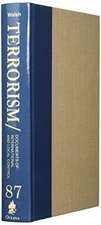Penal Power and Colonial Rule
Autor Mark Brownen Limba Engleză Hardback – 17 ian 2014
To give an account of the emergence of this colonial form of penal power that was distinct from its metropolitan counterpart, this book analyses the British experience in India from the 1820s to the early 1920s. It provides a genealogy of both civil and military spheres of government, illustrating how knowledge of marginal and criminal social orders was tied in crucial ways to the demands of a colonial rule that was neither monolithic nor necessarily coherent. The analysis charts the emergence of a liberal colonial governmentality where power was almost exclusively framed in terms of sovereignty and security and where disciplinary strategies were given only limited and equivocal attention.
Drawing on post-colonial theory, Penal Power and Colonial Rule opens up a new and unduly neglected area of research. An insightful and original exploration of theory and history, this book will appeal to students and scholars of Law, Criminology, History and Post-colonial Studies.
| Toate formatele și edițiile | Preț | Express |
|---|---|---|
| Paperback (1) | 444.62 lei 6-8 săpt. | |
| Taylor & Francis – 18 iul 2015 | 444.62 lei 6-8 săpt. | |
| Hardback (1) | 1059.48 lei 6-8 săpt. | |
| Taylor & Francis – 17 ian 2014 | 1059.48 lei 6-8 săpt. |
Preț: 1059.48 lei
Preț vechi: 1292.06 lei
-18% Nou
Puncte Express: 1589
Preț estimativ în valută:
202.78€ • 210.90$ • 169.93£
202.78€ • 210.90$ • 169.93£
Carte tipărită la comandă
Livrare economică 13-27 martie
Preluare comenzi: 021 569.72.76
Specificații
ISBN-13: 9780415452137
ISBN-10: 0415452139
Pagini: 232
Dimensiuni: 156 x 234 x 20 mm
Greutate: 0.59 kg
Ediția:New.
Editura: Taylor & Francis
Colecția Routledge
Locul publicării:Oxford, United Kingdom
ISBN-10: 0415452139
Pagini: 232
Dimensiuni: 156 x 234 x 20 mm
Greutate: 0.59 kg
Ediția:New.
Editura: Taylor & Francis
Colecția Routledge
Locul publicării:Oxford, United Kingdom
Public țintă
Postgraduate and UndergraduateCuprins
Preface 1. Introduction 2. Colonial Governmentality 3. Immanence and Discovery: Thugs and Native Subjectivity 4. Between History and Nature: Visions of Native Crime and Social Marginality 5. The Temptations of Domination: Framing Disorder 6. Liberal Ontologies: Fashioning the Criminal Tribe 7. The State as Practice: Establishing a Modern Milieu 8. Penal Power and Colonial Rule
Notă biografică
Dr Mark Brown is a Senior Lecturer in the School of Law, Sheffield University, UK, and an Honorary Senior Fellow in the School of Social and Political Sciences at the University of Melbourne, Australia. Previously based in Geneva, he worked as a law and justice consultant focused on actors in the international sphere. His earlier academic career was spent in Australia where he was in the criminology program at the University of Melbourne. He has also been a visiting professor at the Institute for Criminology and Criminal Law at the University of Lausanne and at Delhi University Law School. He is co-author of Penal Culture and Hyperincarceration (Routledge 2013) and author of Penal Power and Colonial Rule (Routledge 2014) and the forthcoming Remaking Criminology.
Descriere
Penal Power and the Colonial Rule argues that Foucault’s alignment of sovereign, disciplinary and governmental power will need to be re-read and re-balanced to account for its operation in the colonial sphere. Proposing a radical revision of the Foucauldian thesis that criminological knowledge emerged in the service of a new form of power – discipline – this text opens up an unduly neglected area of research.





















